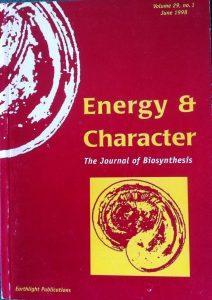in “Energy and character” n. 22 – London Agosto 1991.
The vegetotherapy tradition goes international “Energy and Character” n. 22 – 1991

Vegetotherapy spread from Scandinavia, where Reich first developed it to Italy due to the travels of Ola Raknes to Naples, whereas Federico Navarro build his own school on the basis of vegetive therapy and spread this work to Italy, Spain and South-America. Luciano Rispoli, also from the original Naples group, has begun a more truly international process. First together with Bjorn Blumenthal in Oslo, he created the Oslo-Naples-Axis, the International Vegetotherapy Forum, but more recently as director of the Comittee Scientific International pour la Therapie Psychocorporelle, he has been a focal person in initiating and organising a series of congresses on both sides of the Atlantic in which body-psychotherapists from a number of schools have been invited. Rispoli is a converger, interested in the exchange of ideas and the cross fertilization of methods and is a helpful force in resisting the destructive splitting tendencies that can develop when the polarities in one’s own personality are insufficiently resolved. I quote from Rispoli: “For those who work in the field, the fact of working on the body has never represented a mere technique to add to the verbal but a true theoretical focus on vital elements in a therapeutic relationship and on elements of the personality which have been ignored particularly by the other areas of psychotherapy. To use the body directly in psychotherapy has meant that one comes up against new and particularly intense phenomena: extremely regressive postures and movements, very early memories and perceptions, modifications in the state of consciousness, deep emotions, startling changes in physiological processes (tremors, prickling, perceptual thresholds, heartbeat, temperature, sweating, peristalsis, metabolism etc.). This has created a new theoretical framework rich in perspectives of great interest for the study of the psycho-physical functioning of the human being. The change of connection between macroscopic and microscopic levels (e.g. as in psycho-immunology), the analysis of the relationships which exist between all functional processes, the unification of the criteria by which we study psychic, somatic or psychosomatic disturbances, the collaboration with other sciences such as biology, medicine, physiology etc.”
Rispoli’s report on the congresses he organised and the principles behind them, is reproduced below:
“The first International Congress of Body-Psychotherapy was held in Mexico in December 1987; significantly it took place hardly a month after another notable date: The International Symposium on Wilhelm Reich “History of a suppression” held in Naples. Both events were successful with different characteristics.
The Symposium in Naples took
place with all official support possible. Not only Reichian scholars but also philosophers, scientific researchers in various disciplines contributed. The scientific world and the official institutions, in the presence of press and media gave a start to a process of rehabilitation of the figure of Wilhelm Reich. The congress in Mexico represented the first step in a debate and dialogue between those therapists who work on the basis of body interventions, all trends and tendencies that Reich triggered off. There was an atmosphere of great cooperation and discussion which after went on outside the time formally set aside for such
The Congress in Mexico was organised by:
Federico Navarro, Thierry Carrazco, Jack Painter, Jean-Claude Tremblay, Rafael Estrada Villa, Gerard Guasch, Blanca Rosa Anorve, Edouard Stacke, Arlette Gastine, John Pierrakos, Luciano Rispoli, Gerda Boyesen, Leo Matos, on the following themes:
— The holistic concept of Wilhelm Reich
— The therapeutic process in the psycho-corporal approach
— Psycho-corporal principles and techniques
— Regression, catharsis and change
— The peri-natal and pre-natal experience
— Characterology and Biopathy
— Orgonomy
— Sexuality, society and politics
— The transpersonal experience
It took the form of round-tables, open discussions and above all practical workshops and demonstrations. There was space set aside for a commemoration of Reich (on the 30th anniversary of his death) by John Pierrakos and Luciano Rispoli, chaired by Gerard Guasch.
Certainly it is all just at the beginning but the time seems really ripe for a meeting of all the branches of body-psychotherapy, apart form the divisions and the rivalities which have tended to isolate many in the past and to fragment a situation which is rich in possibilities and in permanent movement. We have a heritage to conserve and develop and the contribution of all who are caring out research and work in our area or in areas which border our fields cannot be essential.”
“Body-psychotherapy will certainly be one of the pillars of the science of tomorrow as long as it learns how to promote its knowledge in this area of theory both in the scientific world and among people generally. To be able to present a strong base both in scientific and methodological terms is an indispensable premise for research which, placed as we are between psychology, biology, physiology and anthropology, has its attractions, but is risky in the sense that it is easy to commit the error of being facile and superficial. The risk, if we don’t follow this path of debate and discussion is that other areas of science or other branches of psychotherapy will end up by taking over these themes and wiping out the field of body-psychotherapy or altering its specific innovative elements; cancelling out progress which have already produced extremely interesting results”.
